| Listing 1 - 10 of 14 | << page >> |
Sort by
|
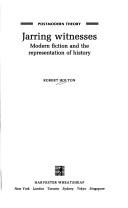
ISBN: 0585102856 9780585102856 0745012833 0133428745 9780745012834 9780133428742 1474469272 9781474469272 Year: 1994 Publisher: New York Harvester Wheatsheaf
Abstract | Keywords | Export | Availability | Bookmark
 Loading...
Loading...Choose an application
- Reference Manager
- EndNote
- RefWorks (Direct export to RefWorks)
Jarring Witnessesbegins by surveying the problem of point of view as a formal, cognitive and cultural determinant in narrative historiography, particularly in the way certain dominant forms of 'legitimate' history have necessitated the suppresson of the voices of 'jarring witnesses'.
Fiction --- Literature and history --- History in literature --- Literature - General --- Languages & Literatures --- History and literature --- History and poetry --- Poetry and history --- History --- History and criticism --- History in literature. --- Literature and history.
Book
ISBN: 3631471068 Year: 1994 Publisher: Frankfurt am Main Lang
Abstract | Keywords | Export | Availability | Bookmark
 Loading...
Loading...Choose an application
- Reference Manager
- EndNote
- RefWorks (Direct export to RefWorks)
English prose literature --- -Historiography --- -Literature and history --- -History and literature --- History and poetry --- Poetry and history --- History --- Historical criticism --- Authorship --- English literature --- History and criticism --- -History --- -Congresses --- Criticism --- Historiography --- #A9712H --- Great Britain --- Historiography. --- Literature and history --- History and criticism. --- -History and criticism

ISBN: 0745012833 Year: 1994 Volume: *1 Publisher: New York London Singapore Harvester Wheatsheaf
Abstract | Keywords | Export | Availability | Bookmark
 Loading...
Loading...Choose an application
- Reference Manager
- EndNote
- RefWorks (Direct export to RefWorks)
Fiction --- Comparative literature --- anno 1900-1999 --- History in literature. --- Literature and history. --- History and criticism. --- Geschiedenis en literatuur --- Geschiedenis en poëzie --- Geschiedenis in de literatuur --- Histoire dans la littérature --- Histoire et littérature --- Histoire et poésie --- History and literature --- History and poetry --- History in literature --- Literature and history --- Literatuur en geschiedenis --- Littérature et histoire --- Poetry and history --- Poésie et histoire --- Poëzie en geschiedenis --- History --- History and criticism --- 20th century

ISBN: 3793090752 Year: 1994 Publisher: Freiburg im Breisgau Rombach
Abstract | Keywords | Export | Availability | Bookmark
 Loading...
Loading...Choose an application
- Reference Manager
- EndNote
- RefWorks (Direct export to RefWorks)
History in literature --- Literature and history --- -History and literature --- History and poetry --- Poetry and history --- History --- Grillparzer, Franz --- -Knowledge --- -History --- Austria --- -History in literature --- -Grillparzer, Franz --- Ao-ti-li --- Ostmark --- Alpen- und Donau-Reichsgaue --- al-Nimsā --- Ausztria --- Østrig --- Avusturya --- Österreich --- Avstrii︠a︡ --- Autriche (Republic) --- Rakousko --- Deutschösterreich --- German Austria --- Republik Österreich --- Austrian Republic --- Avstrija --- History and literature --- Grillparzer, Franz, --- Grilʹpart︠s︡er, Frant︠s︡, --- Knowledge --- History.
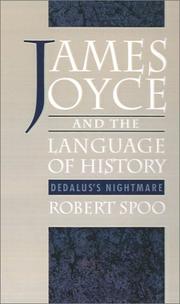
ISBN: 1280442883 1423738071 0195358600 1601299664 9781423738077 9781601299666 9780195087499 0195087496 9781280442889 0195087496 0197724744 Year: 1994 Publisher: New York Oxford University Press
Abstract | Keywords | Export | Availability | Bookmark
 Loading...
Loading...Choose an application
- Reference Manager
- EndNote
- RefWorks (Direct export to RefWorks)
Tracing Joyce's historiographic art to its formative contexts, from his sojourn in Rome in 1906 to the completion of "Ulysses" in 1922, this study reveals a modernist author passionately engaged with the problem of history, forging a new language that both dramatizes and redefines that problem.
Literature and history --- Modernism (Literature) --- History in literature. --- History and literature --- History and poetry --- Poetry and history --- History --- Joyce, James, --- Joyce, James Augustine Aloysius --- Joyce, James --- Dzhoĭs, Dzheĭms Avgustin Aloiziĭ --- Džoiss, Džeimss --- Gʻois, Gʻaims --- Joyce, Giacomo --- Jūyis, Jīms --- Tzoys, Tzaiēms --- Tzoys, Tzeēms --- Джойс, Джеймс --- Джойс, Джеймс Августин Алоїсуїс --- Zhoĭs, Zheĭms --- ג׳ויס, ג׳ײמס, --- ג׳ויס, ג׳יימס, --- ジョイス --- ジェームスジョイス, --- Knowledge --- History. --- Language and languages.
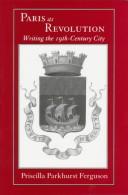
ISBN: 0585176515 0520086422 0520208870 9780520086425 Year: 1994 Publisher: Berkeley (Calif.): University of California press,
Abstract | Keywords | Export | Availability | Bookmark
 Loading...
Loading...Choose an application
- Reference Manager
- EndNote
- RefWorks (Direct export to RefWorks)
French literature --- Politics and literature --- Literature and history --- Revolutionary literature, French --- City and town life in literature. --- Cities and towns in literature. --- Revolutions in literature. --- History and criticism. --- History --- Paris (France) --- In literature. --- Intellectual life --- History and literature --- History and poetry --- Poetry and history --- Literature --- Literature and politics --- Political aspects --- Thematology --- anno 1800-1899 --- Paris --- Revolutions in literature --- Cities and towns in literature --- City and town life in literature --- History and criticism --- In literature --- Revolutionary literature, French - History and criticism --- Politics and literature - History - 19th century - France - Paris --- Literature and history - History - 19th century - France - Paris --- French literature - History and criticism - France - Paris --- Paris (France) - Intellectual life - 19th century --- Paris (France) - In literature
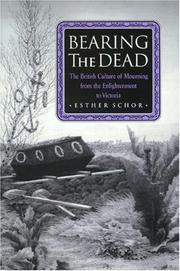
ISBN: 069103396X 9786612752063 1400821487 1282752065 1400813336 9781400813339 9780691033969 1400807131 140080714X Year: 1994 Publisher: Princeton, N.J. Princeton University Press
Abstract | Keywords | Export | Availability | Bookmark
 Loading...
Loading...Choose an application
- Reference Manager
- EndNote
- RefWorks (Direct export to RefWorks)
Esther Schor tells us about the persistence of the dead, about why they still matter long after we emerge from grief and accept our loss. Mourning as a cultural phenomenon has become opaque to us in the twentieth century, Schor argues. This book is an effort to recover the culture of mourning that thrived in English society from the Enlightenment through the Romantic Age, and to recapture its meaning. Mourning appears here as the social diffusion of grief through sympathy, as a force that constitutes communities and helps us to conceptualize history. In the textual and social practices of the British Enlightenment and its early nineteenth-century heirs, Schor uncovers the ways in which mourning mediated between received ideas of virtue, both classical and Christian, and a burgeoning, property-based commercial society. The circulation of sympathies maps the means by which both valued things and values themselves are distributed within a culture. Delving into philosophy, politics, economics, and social history as well as literary texts, Schor traces a shift in the British discourse of mourning in the wake of the French Revolution: What begins as a way to effect a moral consensus in society turns into a means of conceiving and bringing forth history.
Death in literature --- English literature --- -Grief in literature --- Literature and history --- -Mourning customs --- -Mourning customs in literature --- -British literature --- Inklings (Group of writers) --- Nonsense Club (Group of writers) --- Order of the Fancy (Group of writers) --- Manners and customs --- Rites and ceremonies --- Funeral rites and ceremonies --- History and literature --- History and poetry --- Poetry and history --- History --- History and criticism --- -History --- -History and criticism --- Thematology --- anno 1800-1899 --- anno 1700-1799 --- Death in literature. --- Grief in literature. --- Mourning customs in literature. --- Mourning customs --- History and criticism. --- Grief in literature --- Mourning customs in literature
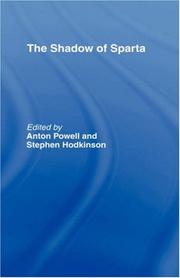
ISBN: 0415104130 0415642957 1134848935 1280329068 0203085078 9780203085073 9781280329067 6610329060 9786610329069 9780415104135 9781134848935 9781134848881 1134848889 9781134848928 1134848927 9780415642958 Year: 1994 Publisher: London: Routledge,
Abstract | Keywords | Export | Availability | Bookmark
 Loading...
Loading...Choose an application
- Reference Manager
- EndNote
- RefWorks (Direct export to RefWorks)
In the past twenty years the study of Sparta has come of age. Images prevalent earlier in the 20th century, of Spartans as hearty good fellows or scarlet-cloaked automata, have been superseded by more complex scholarly reactions. As interest has grown in the self-images projected by this most secretive of Greek cities, increasing attention has focused on how individual Greek writers from other states reacted to information, or disinformation about Sparta.The studies in this volume provide new insights into the traditional historians' question, ""What actually happened at Sparta?"". But the
Literature and history --- Greek literature --- Cities and towns in literature --- History --- Congresses --- History and criticism --- Sparta (Extinct city) --- In literature --- -Literature and history --- -Cities and towns in literature --- -History and literature --- History and poetry --- Poetry and history --- Balkan literature --- Byzantine literature --- Classical literature --- Classical philology --- Greek philology --- -Congresses --- -Lacedaemon (Extinct city) --- Lakedaímon (Extinct city) --- Sparta (Ancient city) --- Greece --- Antiquities --- -History and criticism --- -In literature --- -Balkan literature --- History and literature --- History and criticism&delete& --- History&delete& --- Lacedaemon (Extinct city) --- Congresses. --- Sparta (Extinct city) in literature --- Literature and history - Greece - History - Congresses --- Greek literature - History and criticism - Congresses --- Cities and towns in literature - Congresses --- Sparta (Extinct city) - In literature - Congresses

ISBN: 0520088247 0520208811 058513880X 9780520088245 Year: 1994 Volume: 58 Publisher: Berkeley (Calif.): University of California press,
Abstract | Keywords | Export | Availability | Bookmark
 Loading...
Loading...Choose an application
- Reference Manager
- EndNote
- RefWorks (Direct export to RefWorks)
Latin literature --- Literature and history --- Languages & Literatures --- Greek & Latin Languages & Literatures --- History and criticism --- Littérature et histoire --- 87-3 --- Klassieke literatuur: proza --- -Klassieke literatuur: proza --- 87-3 Klassieke literatuur: proza --- -87-3 Klassieke literatuur: proza --- Rome --- Historiography. --- In literature. --- -Literature and history --- History and literature --- History and poetry --- Poetry and history --- History --- Roman literature --- Classical literature --- Classical philology --- Latin philology --- -History and literature --- History and criticism. --- Historiography --- In literature --- Littérature latine --- Littérature et histoire --- Histoire et critique --- Rome dans la littérature --- Historiographie --- Latin literature - History and criticism --- Literature and history - Rome --- Rome - Historiography --- Rome - In literature --- -History and criticism
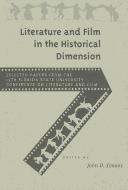
ISBN: 0813012856 Year: 1994 Publisher: Gainesville (FL) : University Press of Florida,
Abstract | Keywords | Export | Availability | Bookmark
 Loading...
Loading...Choose an application
- Reference Manager
- EndNote
- RefWorks (Direct export to RefWorks)
791.43:82 --- Literature and history --- -History in literature --- -Motion pictures and history --- -Historical films --- -#SBIB:309H1324 --- #SBIB:AANKOOP --- 791.43:82 Film en literatuur --- Film en literatuur --- Motion pictures --- History and motion pictures --- Moving-pictures and history --- History --- History and literature --- History and poetry --- Poetry and history --- Congresses --- History and criticism --- -Congresses --- Films met een amusementsfunctie en/of esthetische functie: film en literatuur --- Historical films --- History in literature --- Motion pictures and history --- Congresses. --- #SBIB:309H1324 --- History and criticism&delete& --- CINEMA ET LITTERATURE --- HISTOIRE DANS LA LITTERATURE --- CINEMA ET HISTOIRE --- FILMS HISTORIQUES --- HISTOIRE ET CRITIQUE
| Listing 1 - 10 of 14 | << page >> |
Sort by
|

 Search
Search Feedback
Feedback About UniCat
About UniCat  Help
Help News
News